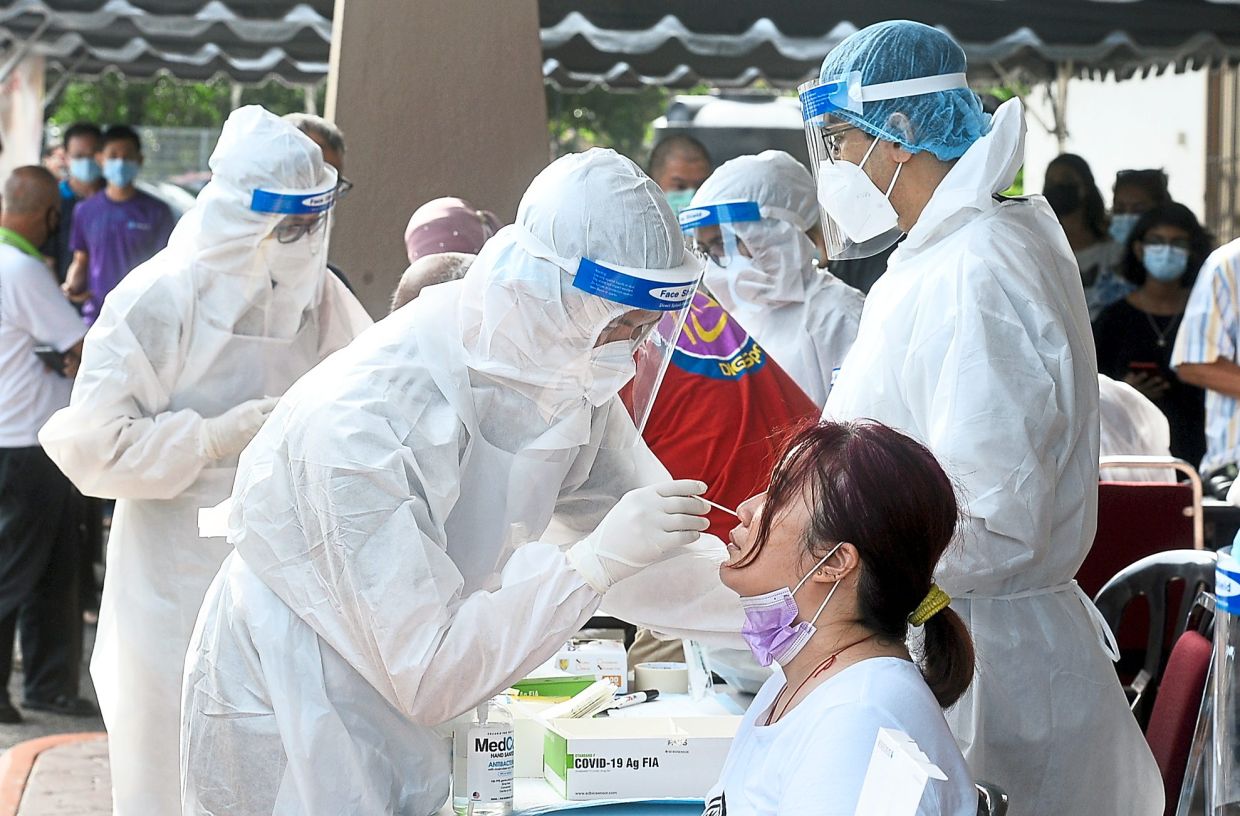
Tougher measure: It should be mandatory for employers to enforce mass targeted testing so that infectious contacts can be rapidly identified, since cases are increasingly asymptomatic. — AZHAR MAHFOF/The Star
IT has been a pretty depressing few weeks for me. I lost a former schoolmate and friend to Covid-19. Two former colleagues from The Star also succumbed to the dreadful virus.
Prominent surveyor and real estate expert Michael Geh became another casualty a week ago from complications arising from Covid-19.
His condition deteriorated 10 days after being admitted into intensive care for testing positive. He had to be intubated after his heart and kidneys weakened.
Geh was just 57 years old. The last time we met was when he attended my late father’s wake services in Penang last July.
Hardly a day passes by without me hearing news of someone I know testing positive or being admitted to the quarantine centres or private hospitals.
Friends and neighbours have also asked me to help get their acquaintances into private hospitals after they were turned away by these overflowing medical facilities.
I have only succeeded once with such requests, after a doctor friend of mine told me that the friend who sought my help “just won a lottery ticket”.
The doctor managed to get my friend a place despite hospitals brimming with Covid patients.
The harsh reality is that Malaysia is now at a truly critical stage. The opportunity for long deliberation and debate is over because we’ve wasted enough time pandering to political and economic demands.
Adding to the dire situation has been horrendous flip-flop calls and contradicting statements which have made our leaders look incompetent. If that’s not bad enough, there were big-shots and celebrities who flouted the law and unabashedly posted pictures of their dubious acts on social media.
But our healthcare system is now severely strained. Forget populist measures because we really need decisive and measured decisions to put an effective action plan together.
Flexible rules, which call for self-discipline, won’t work in Malaysia.
After all, it should be mandatory for employers to enforce mass targeted testing, so that infectious contacts can be rapidly identified, since cases are increasingly asymptomatic.
Never mind if they are just the cheaper RTK-Ag tests, so long as results are received quickly.
Malaysians seem reluctant to get tested unless they’ve come in contact with someone who tested positive, or when they need to prove they’re safe for travelling or for procedures in hospitals.
Many assume we are safe unless we have a bad fever, cough or symptoms of infection.
We also like to think that our family members are safe, so when we eat at the same table, we fail to practise the etiquette of placing a designated spoon or pair of chopsticks on every dish.
Family members, friends and colleagues are “red flags”, but because we are culturally always polite, we try to avoid this delicate and sensitive subject.
We forget the people closest to us go out to work, or to populated places like the supermarkets, and like anyone else, risk being exposed to an infected person.
Malaysians should be encouraged to stay isolated at home if they only display mild symptoms.
There’s little point in shipping asymptomatic people to Sungai Buloh and Serdang and further stretching these centres.
These medical facilities are not hospitality or catering services. Sure, the toilets can be cleaner, but stop whining about the food and services.
Our frontliners have been tasked with saving lives, and they are risking theirs daily when they go to work at these healthcare centres.
Given the Emergency powers the government wields now, it’s imperative we increase Covid-19 beds and ICUs by integrating the public and private sectors, and government-linked companies.
But these facilities amount to nothing if we’re short of doctors and nurses. Private medical personnel need to be conscripted into a national army of medical Covid-19 fighters because we’re at war. This is national service, so we must call on them.
Malaysia also needs to scale up vaccination exercises by incorporating the army, fire brigade and non-governmental organisations in affected areas, including the small towns and rural areas.
In Britain, these service men and women have also been roped in. Places of worship have even served as vaccination centres to cut down travelling and costs for people.
This is a long-haul situation which needs proper strategy. The problem won’t go away even if we impose a few rounds of lockdowns. It will only reduce the numbers momentarily, until the entire nation is vaccinated, of course.
New strains are emerging, and people who have completed their vaccination have even been infected, so these cases should serve as lessons to our planning because we all need to take care of ourselves.
There’s a lot of anger with the government because of the increasing numbers, but we share the blame, too.
We couldn’t obey two simple but effective measures – wear a face mask and avoid crowds.
Instead, we continue with unnecessary physical meetings and get-together meals. We also go shopping to kill the boredom, visit friends, and adamantly insist on Ramadan bazaars while our populist leaders accommodate demands.
But when we lose our dear ones to the pandemic or find ourselves admitted to hospital, we begin to understand better that strong measures are necessary.
It’s time to wake up from our slumber of indifference because Covid-19 cases are now affecting people we know personally, and they’re no longer mere statistics.





